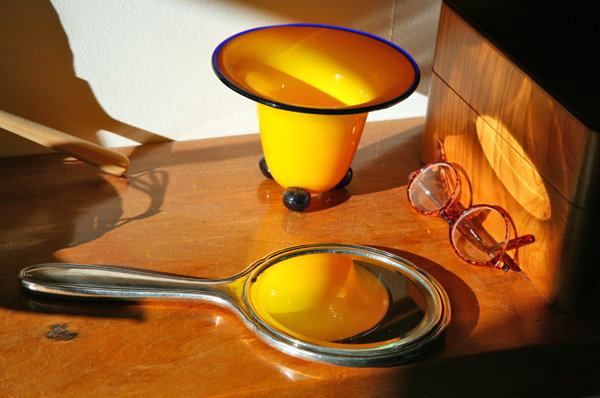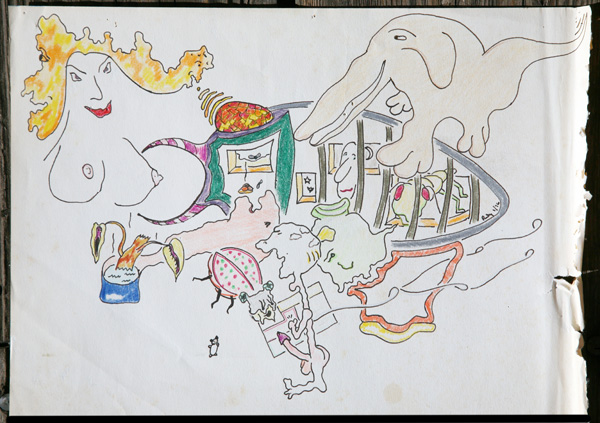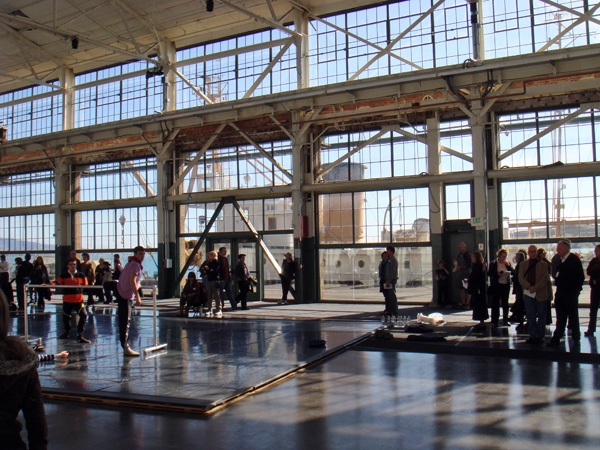I participated in a group Steampunk reading a couple of weeks ago, and Rick Kleffel made a podcast of me reading from The Hollow Earth. You can click on the icon below to access the podcast via Rudy Rucker Podcasts.
And now another excerpt from my memoir-in-progress, Nested Scrolls. Note that you can buy White Light at this link.

In Heidelberg in 1978, I wrote seven short stories—and then White Light, a science fiction novel about infinity. With White Light I got serious about being a novelist.
I began writing the book in longhand one weekend while I was alone with the kids. Sylvia was visiting her relatives in Budapest. I called my novel White Light, in memory of a memorable vision I’d had at Rutgers. And I gave it a subtitle lifted from a paper by Kurt Gödel: What is Cantor’s Continuum Problem?

The main character of White Light was a math professor, closely modeled on me, and the setting was very much like Geneseo. The practice of writing science fiction about real life is what I came to call transrealism. In White Light, my life in Geneseo was the real part, and the trans part was that my character in the novel leaves his body and journeys to a land where Cantor’s infinities are as common as rocks and plants.
White Light was influenced by the Donald Duck and Zap comics that I loved so well one chapter features Donald and his nephews, in another chapter objects start talking, as they sometimes do in R. Crumb strips. I also used the papers by Cantor that I’d been reading—and included the man himself as a character.

Over the years, I’ve often worked by alternating between writing science fiction and writing popular science. So it was fitting that I was working on a popular nonfiction book about infinity at the same time that I was writing White Light. Each endeavor was feeding the other.
I got into a very pleasant and exalted mental state during this period of time. I remember having a magical dream in which I was climbing onto the ridge of a mountain. The stone underfoot was slippery pieces of shale, and among the stones I was finding wonderful polyhedral crystals the size of walnuts or croquet balls. Even within the dream, I knew that these treasures represented my wonderful new ideas.

I finished the manuscript for White Light late in 1979, when I was thirty-three. I tried sending it to a big-time agent—who charged me a couple of hundred bucks to read my manuscript, disliked it, and refused to submit it to any publishers. So I started trying to sell it by myself.
I sent it off to Ace Books, getting their address from the title page of Ian Watson’s Miracle Visitors, a book written on the same wavelength as White Light. While I was waiting for my book to work its way through the Ace slush pile, I went to my first science fiction convention, Seacon in Brightontaking the train and ferry from Heidelberg.
The atmosphere at mathematics conferences had always been rather frosty. There weren’t enough jobs to go around, and newcomers weren’t particularly welcome. But the science-fiction folks were, like, “the more the merrier.” I loved the vibe.

Some well-dressed hippies from London (including Gamma) got me high and introduced me to a hipster called Maxim Jakubowsky. Maxim was editing a new line of books for the Virgin record company. Their first book was going to be about the punk band The Sex Pistols, but they were looking for radical SF novels as well.
I’d brought along a single Xerox of the White Light manuscript, and I handed it to Maxim on the spot. And a few weeks later he made an offer to buy the British rights for the book. A month after that, Ace made an offer for the US rights. I felt like a plant pushing out from the soil into the sun and air.









November 11th, 2008 at 8:39 pm
White Light is one of my favorites of your novels, I love the acid trip dream style narrative.
I re-read it again recently and it was great to pick up on things I missed the 1st time.
Highly recommended!
Reminds me a little of my favorite kids book – “The Phantom Tollbooth”. It’s that good!
November 13th, 2008 at 2:02 pm
The year you were at IAFA, some bug in the reservation system had the clerks assuring us all that we had ‘gotten the last room.’ How could that be, I wondered, and then realized they were probably moving us all down one room in an infinite series.